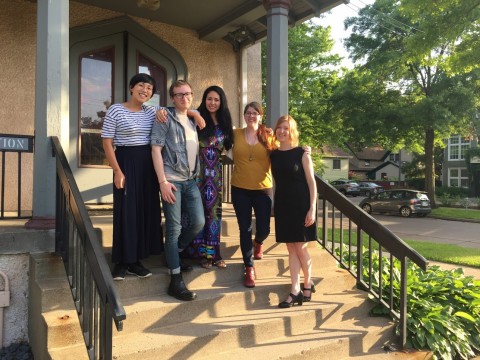PWC Welcomes Australian Playwright Michele Lee

Australian playwright Michele Lee spent a month at the Playwrights’ Center for a whirlwind introduction to American theater and play development practices.
“There isn’t a development center like this in Australia for playwrights,” Lee remarked. “Nothing where you can all convene and use a space. Here the program is writer-focused, not project-focused.”
She spent her time in Minnesota editing and workshopping her play Going Down, which she has been developing since October. Additionally, she got to experience other readings and performances both at the Playwrights’ Center and around the city. In her time here, she found that the Center’s existence was not the only deviation from Australian theater.
“I think there’s just a lot more new work happening here,” she says. “In comparison, Melbourne is much more populous than Minneapolis, but we don’t have as many theater venues. So if this is indicative of similar large cities in America, then I think there are more theaters here in general.”
Lee also noted the practice of “radical hospitality” at some local theaters and their attempt to make the arts more accessible to the community. “That kind of pay-what-you-can in the arts is not as prevalent in Australia yet, so the cost of going to the theater is more expensive, which makes it feel more elite. You’d be looking at $100 to go and see a play, and as an average person, who is going to spontaneously go and see a play when it’s $100?“
She commented on the actual theatrical products as well, saying that Australian work seems to have a stronger European influence. Furthermore, American plays seem to have a “real conversation with America’s history and what it means today.”
Lee’s play Going Down is a story of identity that follows Asian Australian Natalie Yang, an author who initially wants to be known for writing about things beyond her heritage. “I think often when I write about being Asian, then generally I want people to have a broader understanding of the nuances of that.” Lee says. “I know people will just do whatever they do in their head, and they’ll take from it what they will. But generally, I want them to think a little bit.”
Despite the myriad of differences in theater cultures, Lee’s play also addresses issues American theater knows very well. “Like America, Australia is predominantly a white culture and, of course, it’s not only that,” Lee says. “I’d love the play to contribute to Australia getting a little closer to a place where it can more bravely examine ‘What does it mean to be Other in Australia?’ It’s not just about our food and our sad stories about how we got here.”
“All the differences around Australian and American theater, that’s been useful learning,” Lee said at the end of her workshop. “Every time you see another playwright’s work, you learn from what they’re doing. I’m definitely very glad I came here and fortunate to see the things I did.”

 Facebook
Facebook Twitter
Twitter